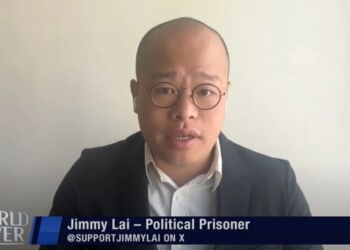Ten years after Ilya Ponomarev fled from Russia, the Putin government launched its fifth assassination attempt, leaving his Ukrainian home in ruins while the opposition leader and his wife were rushed, covered in blood, to the hospital. Three hundred sixty-eight days later, Ponomarev sat down with The American Spectator in Washington, D.C., for an exclusive interview.
Profile of a Parliamentarian
Ponomarev served in the Russian Duma, their equivalent of Congress, beginning in 2007. Coming from an established political family, his work transcended party lines as he gradually moved further and further into the Russian opposition to the increasingly powerful President Vladimir Putin. By 2014, his opposition reached the breaking point when he became the sole member of the Duma to oppose Russia’s annexation of the Ukrainian province of Crimea.
Within months, Ponomarev was forced to flee his nation, vowing to return when liberty dawned on the land. He told The American Spectator that most of his work since February 2022 has been on the battlefield of Ukraine, where he has been involved in some capacity with the elusive National Republican Army, one of several groups of Russians opposed to President Putin.
Past assassination attempts had been far from successful, though the nearness of death on Aug. 1, 2024 only galvanized Ponomarev, at least in his telling. The past year has seen him spend less time in Kyiv, however, due to his growing role in the Ukrainian defense industry. Ponomarev became a Ukrainian citizen in 2019 and told The American Spectator that he has been offered the citizenship of several other nations, but he has declined to accept citizenship outside of his beloved Eastern Europe.
In a similar vein, Ponomarev balks at being called “pro-West.” He told The American Spectator, “I consider myself to be pro-Russian,” though “I see that Russia’s long term interest is to be pro-Western.” He was adamant that “it’s totally stupid for a politician in one country to say he is for other countries, he is for his country and his people.”
Emphasizing the duty of a lawmaker to his constituents and his nation, Ponomarev recalls, “I didn’t care about Ukraine at all when I was making this vote [against war in 2014],” rather “I was thinking about [my voters], not about Ukraine…for them it would mean war, for them it would mean sanctions……I was thinking about the interest of my people.” He describes himself as having cast this vote “not because I like the E.U. so much, but because I like Russia.”
Ponomarev’s own politics are complex, particularly through an American lens. On one hand, he told The American Spectator that he is naturally a “libertarian” in philosophy, but his “view on the economy is rather Keynesian” and thus “left libertarian.” However, he frowns visibly as he remembers the social values the term “Left” conjures in the West.
Thus, Ponomarev clarified to The American Spectator, “I am not woke” and noted both that he is a faithful Eastern Orthodox Christian and that his “friends in the West … usually are on the right side of the political spectrum.” Musing, he took a moment to ridicule woke policies of the American Left such as affirmative action, noting, “I am against positive discrimination as much as I am against negative discrimination.”
Ponomarev’s vision for “a very decentralized federation,” he said to The American Spectator, is inspired by “the constitutional model of the United States.” In comparing Russia to the West, Ponomarev told The American Spectator that believes deeply that “we have the same civilizational basis” in “Christianity, the Biblical values, [and] the Renaissance.”
Looking at a Nation in Crisis
In response to pointing out that Ukrainian President Volodymyr Zelensky has underperformed in hypothetical polling placing him against Ukraine’s prominent General Valerii Zaluzhnyi, Ponomarev leapt to Zelensky’s defense with caution. Ukraine’s president, he told The American Spectator, is “not perfect,” but “as a war president, he is doing remarkably,” despite the wishes of many for “better management of the economy.”
Ponomarev also questioned the potential for General Zaluzhnyi to run, saying that Zelensky is “virtually unchallenged” in the public eye. He also defended Ukraine’s decision not to move forward with scheduled presidential elections in 2024, arguing that “it would be absolutely crazy to have elections in the situation of war.” In his view, such a feat would be “technically impossible” with the state of the country and its displaced population unless done online, in which case “there would be a lot of criticism.”
Asked about the state of the opposition within Russia, Ponomarev waved off the idea, stating that while “these opposition parties here and now are allowed to win … it means nothing.” He disputed the legitimacy of oppositionists such as Grigory Yavlinsky, leader of the Yabloko Party, viewing them as “all imitation.”
To Ponomarev, the real members of the opposition are “all in emigration right now,” but they risk “getting out of touch with reality” instead of being productive.
He harshly criticized the many Russian oppositionists who oppose Ukraine, stating, “The only people who are doing something are these resistance fighters who are organizing attacks on railroads, helping Ukrainians with other acts of sabotage inside the country.”
Overall, Ponomarev noted to The American Spectator that he is differentiated from much of the Russian opposition by his support for a “public referendum in all the regions” to give provinces with ethnic-minority majorities such as Chechnya the chance to secede if they wish, though he expects “the majority will stay.”
However, he noted that he shares “common views” and opposition to Putin across factions. For instance, many of the most radical supporters of the war who oppose Putin as an insufficiently nationalist “neoliberal” would have their place in Ponomarev’s vision for a democratic “Russian republic” that scraps the model of the Russian Federation.
Peace at Hand?
Ponomarev told The American Spectator, “I think that it is a very decent probability that it [end of war] will happen.” Having been deeply involved in the conflict from its beginning, Ponomarev believes that “Putin … needs to be able to say to his fellow countrymen…that these years were not wasted.”
Ponomarev said to The American Spectator that believes that earlier peace opportunities failed as Putin is inclined to “never take the first offer, because you can get better,” while “the summer is the best time for … just a little bit of grabs here and there” to strengthen the Russian position before a return to negotiations.
From the former Russian parliamentarian’s perspective, the Trump administration brought welcome changes. Ponomarev stated that “Russian elites are very much unhappy” and told The American Spectator that he believes “Trump will apply more and more pressure,” akin to the recent tariffs on Russia’s key ally India.
While Ponomarev told The American Spectator that he “is not a MAGA person” on ideology, he praised President Trump. In his view, “Trump’s position is way more honest than Biden’s,” as “both administrations were very transactional, but Biden and his people were saying a lot of nice words, but when it came to actions they were contradicting what they were saying.”
Ponomarev told The American Spectator that he thinks “they [the Biden administration] were very afraid of Ukraine’s victory because they were afraid that Putin would start a major war with the West” and that “this fear was paralyzing all of their efforts.”
Summing up his views on Biden’s term, Ponomarev simply told The American Spectator with a mirthful smile: “I personally don’t like when people say something in public and do something opposite…with Trump everything is way more clear, he does what he says…[even if] it may be unpleasant.” Further, “Trump saw many [criminal] people like [Putin] in his business career, this doesn’t make him a friend of these people, but he knows how to deal with them.”
Continuing on the topic of American politics, Ponomarev pointed to Iran, where “the Democrats were reluctant to start from action … but strategically in the Middle East you need to be consistent…and project strength.” He told The American Spectator that “when you project weakness, which was the case with the previous administration and the Obama administration, you will invite conflict.” In comparison to the hypocrisy of Democratic administrations, Trump’s “position is way more honest than the Democrats who said lots of words about global democracy and stability.”
The American Spectator’s interview with the most prominent Russian oppositionist since the death of Alexei Navalny closed by asking him to justify why the American Right ought to support Ukraine. Ponomarev responded by harkening to Winston Churchill, arguing that a Russian victory “would continue in Taiwan” by setting a precedent for a Chinese invasion.”
Ultimately, Ponomarev holds that the conflict benefits “abstract … American interests” but more directly that stopping Russian expansion now protects “the lives of American soldiers.” In his view, a Russian conquest of Ukraine would upend world peace in every corner. In the meantime, it is the life of Ilya Ponomarev and his fellow dissidents on the line every day.
READ MORE by Shiv Parihar:
Superman Captures the Fall of 20th Century Liberalism
Marxists Have No Claim to Archbishop Oscar Romero
Young Conservatives Should Conquer Liberal Colleges Instead of Attending Hillsdale




![Gavin Newsom Threatens to 'Punch These Sons of B*thces in the Mouth' [WATCH]](https://www.right2024.com/wp-content/uploads/2025/08/Gavin-Newsom-Threatens-to-Punch-These-Sons-of-Bthces-in-350x250.jpg)
![ICE Arrests Illegal Alien Influencer During Her Livestream in Los Angeles: ‘You Bet We Did’ [WATCH]](https://www.right2024.com/wp-content/uploads/2025/08/ICE-Arrests-Illegal-Alien-Influencer-During-Her-Livestream-in-Los-350x250.jpg)







